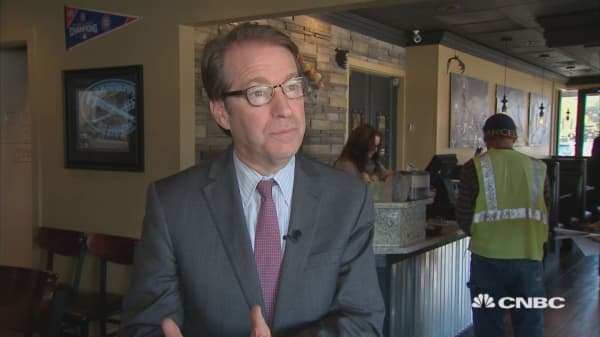- Forecasters believe about 10 Senate seats — in Arizona, Florida, Indiana, Missouri, Montana, Nevada, North Dakota, Tennessee, Texas and West Virginia — are the most likely to flip this year. Democrats hold six of those, while Republicans control four. But polls have moved away from Democrats in two of the contests: Democratic Sen. Heidi Heitkamp's defense of her seat in pro-Trump North Dakota, and Rep. Beto O'Rourke's bid to upset GOP Sen. Ted Cruz in red Texas.
- The GOP has about an 80 percent chance of keeping control of the Senate, only a slight dip from a week ago, according to FiveThirtyEight. Republicans' chances of holding the chamber roughly mirror their chances of losing the House, according to the site. The GOP currently holds a 51-49 majority in the Senate.
- Cook considers eight of those 10 key races toss-ups. On Friday, it put Heitkamp's seat in the lean Republican column. It also lists Democratic Sen. Joe Manchin's re-election bid in West Virginia as one that leans Democratic. If those races hold, Democrats would have to carry out the daunting task of flipping three of the four GOP-held seats in Arizona, Nevada, Texas and Tennessee, while not losing any more of its own toss-up contests, to flip the two net states needed to take a majority.
- Sabato also favors the GOP to flip North Dakota and hold Tennessee and Texas. In addition, it gives Manchin the edge in his re-election campaign. Again, the forecaster shows a difficult path to Democrats winning a Senate majority.
Cook's downgrade of Heitkamp's re-election chances was only the latest hit for the Democratic incumbent. Sabato had already moved the race to leans Republican as polls increasingly show an advantage for GOP Rep. Kevin Cramer in a state Trump won by more than 30 points.
Polls had recently moved away from Democratic former Gov. Phil Bredesen, who hopes to beat GOP Rep. Marsha Blackburn and flip a red Senate seat in Tennessee. Then on Thursday, a survey showed Bredesen is still in the hunt.
A Vanderbilt University poll found him leading Blackburn by 1 percentage point. It is unclear now whether the survey is an outlier or a sign the state is still in play.
Meanwhile, a race where Republicans appeared to have a stunning chance for an upset has reset in favor of Democrats. Democratic Sen. Bob Menendez's polling lead in blue New Jersey had evaporated in recent months, as Republican former pharmaceutical CEO Bob Hugin spent heavily to hammer the senator over corruption charges that ended in a mistrial.
Monmouth University and Quinnipiac University polls this week found leads of 9 and 7 percentage points, respectively, for Menendez. In a sign of the race's competitiveness, a pro-Senate Democratic super PAC on Tuesday said it would drop $3 million into New Jersey on an ad tying Hugin to Trump.






